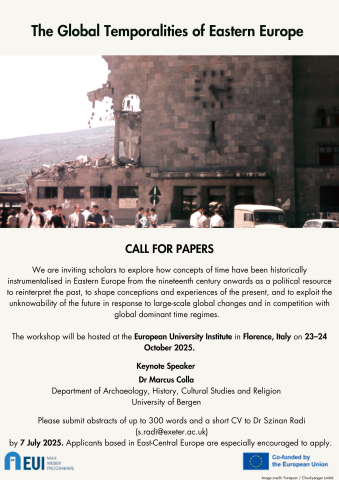
European University Institute, Badia Fiesolana (Italy), 23–24 October 2025
This two-day workshop invites scholars to explore how concepts of time have been historically instrumentalised in Eastern Europe from the nineteenth century onwards as a political resource to reinterpret the past, to shape conceptions and experiences of the present, and to exploit the unknowability of the future in response to large-scale global changes and in competition with global dominant time regimes.
In recent years, ‘time’ has emerged as a key analytical category (Koselleck, 2004), a development often labelled as the ‘temporal turn’ in history and the social sciences. Recent scholarship has largely converged around three main themes: the politicisation of time (Clark, 2019), the dynamics of large-scale temporal regimes across societies and cultures (Hartog, 2015), and the multiple scales and dimensions through which historical change unfolds (Braudel, 1984). Researchers focusing on Eastern Europe have actively participated in this shift, using ‘time’ as a lens to re-evaluate the region’s historical specificities, while simultaneously seeking to overcome reductive binaries, such as that between East and West (Colla and Gjuričová, 2023; Deschepper et al., 2024; Rindzevičiūtė, 2023). While these studies have provided valuable insights, they have not yet fully accounted for how global temporal regimes and alternative structures of time in their interaction with local conceptions have shaped Eastern Europe’s political, cultural, and economic trajectories (Brauner, 2024; Edelstein et al., 2020).
Building on these insights, this workshop seeks to examine the intersections of local and global temporalities and their varying manifestation in Eastern Europe. We are particularly interested in how temporal frameworks have been constructed, operationalised, and contested to legitimise political authority, reshape collective memory, and mediate the region’s relationship to global dynamics, either by reinforcing national boundaries or creating new forms of transnational connection, whether despite or because of Eastern Europe’s ongoing engagement with the wider world.
Potential topics may include, but are not limited to:
- the relationship between local and global chronopolitics and their role in ‘discounting’ alternative futures
- the construction, contestation, and negotiation of dominant national and global chronologies and narratives of time
- memory regimes and visions of the future, and their transnational entanglements, such as in the fields of art, architecture, urban planning, and industrial design
- the influence of structural and conjunctural cycles on local and short-term perceptions of episodic time
- the temporality of resources (broadly defined), their commodification, and exchange across regions
- the impact of globalisation, technology, and innovation on subjective and uneven experiences of time and daily rhythms.
We are planning with four panels, each consisting of two papers, followed by a discussion and a Q&A. Dr Marcus Colla (University of Bergen) will give a keynote on the temporalities of Eastern Europe vis-à-vis the West.
Applications are welcome from scholars across the social and historical sciences, broadly defined, provided papers adopt a historical approach. Prospective applicants based in East-Central Europe are especially encouraged to apply.
Please send abstracts of up to 300 words, including a title, and a short biographical note to Dr Szinan Radi, s.radi@exeter.ac.uk by 7 July 2025. If selected, panellists will be requested to pre-circulate an extract of their paper (up to 3,000 words) by 26 September 2025. Accommodation for two nights in Florence (in walking distance to the venue) and travel expenses within Europe will be covered.
The workshop is sponsored by the EUI Max Weber Programme and the EUI Widening Europe Programme.
References
Braudel, F., 1984. The Perspective of The World, Civilization and Capitalism. Collins, London.
Brauner, C., 2024. Time: Temporality in Global History, in: Osterhammel, J., Gänger, S. (Eds.), Rethinking Global History. Cambridge University Press, Cambridge, pp. 70–91.
Clark, C., 2019. Time and Power: Visions of History in German Politics, from the Thirty Years’ War to the Third Reich. Princeton University Press.
Colla, M., Gjuričová, A., 2023. 1989: The Chronopolitics of Revolution. History and Theory 62, 45–65.
Deschepper, J., Kalashnikov, A., Rossi, F. (Eds.), 2024. Time and Material Culture: Rethinking Soviet Temporalities. Routledge, London.
Edelstein, D., Geroulanos, S., Wheatley, N. (Eds.), 2020. Power and Time: Temporalities in Conflict and the Making of History. University of Chicago Press, Chicago.
Hartog, F., 2015. Regimes of Historicity: Presentism and Experiences of Time. Columbia University Press.
Koselleck, R., 2004. Futures Past: On the Semantics of Historical Time. Columbia University Press, New York.
Rindzevičiūtė, E., 2023. The Will to Predict: Orchestrating the Future through Science. Cornell University Press, New York.
